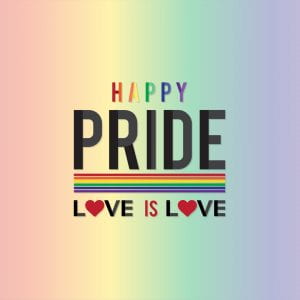 I’ve been asked to talk a little bit about myself, the work I do and my time at Marjon, to mark the occasion of Pride Month.
I’ve been asked to talk a little bit about myself, the work I do and my time at Marjon, to mark the occasion of Pride Month.
I’ll start by introducing myself. I’m Dr (these days) Alan Butler, I’m one of the directors of Pride in Plymouth. I’m one of a group of people involved in putting on a big event on Plymouth Hoe once a year to celebrate the LGBT+ communities in Plymouth – Lesbian, Gay, Bisexual, Trans and a whole host of other people who perhaps don’t fit quite as comfortably in the heteronormative cis-gender world we find ourselves still very much part of.
In addition to the big event though we do a whole load of other work. My PhD is based in an archive where we spent 10 years now interviewing people and asking them what it is like to be LGBT+ in the city, getting them to share their stories and talk about who they are.
As part of that, I’ve kind of dodged telling my story as much as I possibly can. I think we’re all a little bit guilty of that, “Oh my story is not very interesting, nothing to hear”. I’ve been caught a little bit with this because I’ve been asked to talk about myself.
If I go back to my time at Marjon, I was at the time a mature student. I think I was about 28 when I started, early 30’s when I finished. I was there around the turn of the millennium which sounds an awful long time ago but it’s not really.
I came to Marjon having started an Open University degree and deciding that it was just too isolating for me – it works really well for some people, it didn’t work for me. The idea of converting that bit of degree I had and going somewhere a bit more physical was quite exciting.
When I talk about the LGBT+ community, I talk a lot about safe spaces and places where people feel able to be themselves. And Marjon became a place like that but I didn’t realise it right at the beginning. I arrived – Sociology and English Literature were my subjects – and I sort of fitted in, enjoyed the life at Marjon, it’s a real community of its own and it was very exciting to be there.
I still didn’t really talk about myself very much. I made some really good friends, got really engaged in the course and other things. I didn’t really share much and actually in the end I was challenged by people. They said, look you know you’re holding something back, there’s something about yourself that you’re not saying and why not? We’re friends, we’ll support you. So Marjon is really the place I came out.
I remember very reluctantly admitting to somebody that perhaps the reason she’d never met me was because I didn’t spend a lot of time dating women. Having said that and shared that in a place that felt safe and secure to me, I then sort of promptly felt like I had to run away. How could I stay here now all these people know?
It’s a really difficult thing coming out – people assume that it’s something you do once in your lifetime and then it’s done. But you don’t, you continually negotiate that. You continually come out. You walk into a new situation, you meet someone new, you decide what you’re going to tell them, how much you’re going to tell them.
And having sort of outed myself at Marjon I really felt I had to run away. I felt I can’t be here anymore, because I blotted my copy book. I’m sorry to admit that – my generation growing up in the era of Section 28, you kind of internalise quite a lot of shame. Section 28 was a law passed in 1988 that stopped councils and schools “promoting the teaching of the acceptability of homosexuality as a pretended family relationship.” It meant isolation for a lot of LGBT+ kids at the time and it was finally repelled in 2003. You felt like it’s something you should be embarrassed about, or I certainly did.
It was at Marjon that people said, so what, it’s part of you, why should you be ashamed? This is where really Pride comes from. You know Pride is a rejection of that stigma and Marjon was a really significant place for me to feel that. It remains somewhere I am really really fond of and whenever I get the opportunity to come up and get involved in Pride on campus events there, I really feel connected.
It’s changed a lot, we’ve all changed a lot. LGBT lives and heritage has shifted phenomenally in the last 10 to 20 years. It’s shifted all around and it’s shifted massively at Marjon, but I’ll never forget that Marjon was that place where people made me feel brave enough to take that stand. I’ll always be grateful. So happy pride month to Marjon!
Hello Alan, I remember you well from Marjon and you may remember me from the BA office when you were doing your PhD. You reminded me in this piece of why I loved working at Marjon, it was the community and sense of family with staff and students that was so wonderful. In my role in Academic Counselling in student support I was privileged to hear similar stories from a number of students seeking help to negotiate their new found openness with the student cohort with maintaining their degree whilst negotiating the tricky path with family and other friends. I loved reading your story thank you Sally Mills